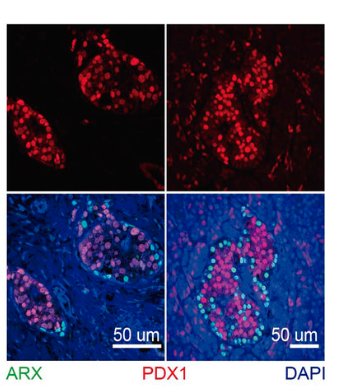
Yotam Drier (Bernstein lab) and Paloma Cejas (Shivdasani lab at DFCI) describe how enhancer signatures in non-functional PNET tumors can be used to stratify subtypes and predict patient outcomes. Read the paper in Nature Medicine. This was a great collaboration between the Bernstein lab at MGH, the Shivdasani lab at DFCI, several teams of clinicians led by Matt Kulke and Daniel Chung, our team at the Broad Institute, and colleagues at the UMC Utrecht Cancer Center.
Most pancreatic neuroendocrine tumors (PNETs) do not produce excess hormones and are therefore considered ‘non-functional’. The team generated enhancer maps for many PNET tumors and used these to infer gene regulatory programs. They found that non-functional PNETs fall into two major subtypes, with epigenomes and transcriptomes that partially resemble islet α- and β-cells – specified by the transcription factors ARX and PDX1. 84% of 142 non-functional PNETs expressed one or the other factor, occasionally both. Among 103 cases, distant relapses occurred almost exclusively in patients with ARX+PDX1− tumors. These markedly different outcomes belied similar clinical presentations and histology and, in one cohort, occurred irrespective of MEN1 mutation. This work provides insight into cell lineage correlates of non-functional PNETs, accurately predicts disease course and can potentially inform postoperative clinical decisions.
